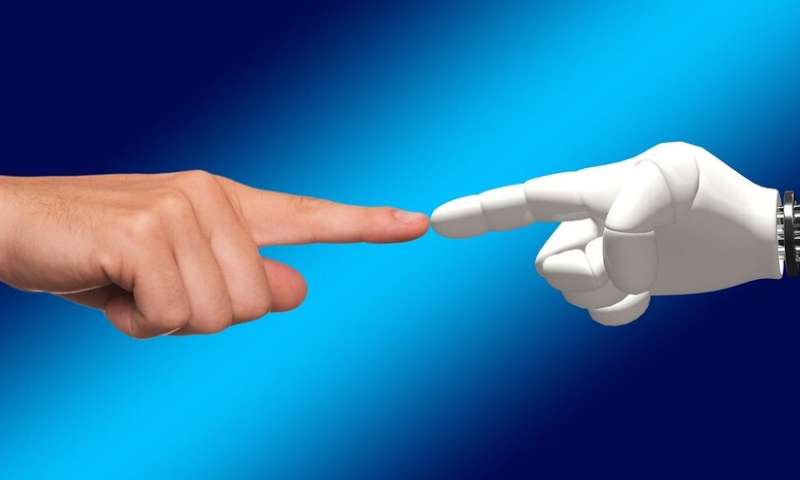
The only constant is change. Presumptions harden as truth but then there is occasion to throw presumptions off the table and start again. That's the deal with information technology using AI for business and with robots unleashed in the workplace. The presumptions are that such tech is potentially harmful and that if those robots rebel against you, you're toast.
A new study has a sunnier view. People have more trust in robots. "The majority (65 percent) of workers are optimistic, excited and grateful about having robot co-workers and nearly a quarter report having a loving and gratifying relationship with AI at work," said the press release provided by Oracle.
The information comes from an annual study that Oracle runs with the research company Future Workplace. The title of the report is "Artificial Intelligence Is Winning More Hearts and Minds in the Workplace." That is quite the positive headline; is it an aggressive spin or a realistic reflection that people are so amenable to workplace AI?
Responses were taken from 8,370 employees, managers and HR leaders across 10 countries. (And why not at least ask: Whether responses would be good or negative, AI has changed the work environment and influences how human resources and managers behave in order to keep organizations on track.)
Judith Humphrey, the founder of a Toronto-based communications firm, in Fast Company had a look at the study. She thought it presented "a strong case that AI is already winning the hearts and minds of employees."
Consider technologies that remove the grunt work so that managers can turn to more creative pursuits; the technologies that teach workers how to maximize communications via imaginative digital platforms; technologies that add weight to their career portfolios as they seek promotions or new jobs.
Humphrey noted study results: "New technologies, according to respondents, will help them master new skills (36%), gain more free time (36%), and expand their current role so that it's more strategic (28%)."
With that said, people outside Oracle still may not easily accept the very thought of an employee at any company trusting a machine more than a human manager to "do the right thing" or make the right assessment.
A closer look at the survey questions, though, indicate the response was significant; the outcome had its own logic.
What, specifically, were the activities that respondents felt could be done better by robots than by their managers? These were (1) providing unbiased information, (2) maintaining work schedules, (3) problem solving and (4) managing a budget.
Increased adoption of AI at work is having an impact on the way employees interact with their managers. The traditional role of HR teams and the manager is shifting.
Oracle's press summary of the findings noted that "64 percent of people would trust a robot more than their manager and half have turned to a robot instead of their manager for advice."
As for Oracle's press release headline, "Artificial Intelligence Is Winning More Hearts and Minds in the Workplace," it is not an inaccurate spin but more a snippet from a larger thought. AI is winning more hearts and minds in the realm of what AI is good at doing, leaving room and time for managers to do what they do best, coach, motivate, inspire, build teams.
Jeanne Meister, founding partner, Future Workplace: "As workers and managers leverage the power of artificial intelligence in the workplace, they are moving from fear to enthusiasm as they see the possibility of being freed of many of their routine tasks and having more time to solve critical business problems for the enterprise."
Humphrey in Fast Company did not miss the part in the study where respondents pinned what,, on the flip side, their managers did better than robots: "understanding my feelings," "coaching me," "creating or promoting a work culture" and "evaluating team performance."
A prophetic enough article appeared back in 2016 in Harvard Business Review where the authors argued that artificial intelligence will soon be able to do the administrative tasks that consume much of managers' time faster, better, and at a lower cost.
The authors reflected on study findings at the time. The attitude was encouraging; managers could see the difference between intelligently leveraging AI for decision support and data-driven solutions as opposed to fighting AI as a threat leading to their removal, leadership skills and all.
"Writing earnings reports is one thing, but developing messages that can engage a workforce and provide a sense of purpose is human through and through," the authors wrote. "Tracking schedules and resources may soon fall within the jurisdiction of machines, but drafting strategy remains unmistakably human. Simply put, our recommendation is to adopt AI in order to automate administration and to augment but not replace human judgment."
In the Oracle study, meanwhile, workers in India (89 percent) and China (88 percent) were more trusting of robots over their managers. Singapore followed by 83 percent; Brazil, 78 percent; Japan, 76 percent; UAE, 74 percent; Australia/New Zealand, 58 percent; U.S., 57 percent; UK, 54 percent; and France, 56 percent.
© 2020 Science X Network
Citation: Study says that we trust our workplace robots (2020, January 22) retrieved 22 January 2020 from https://techxplore.com/news/2020-01-workplace-robots.html
This document is subject to copyright. Apart from any fair dealing for the purpose of private study or research, no part may be reproduced without the written permission. The content is provided for information purposes only.
